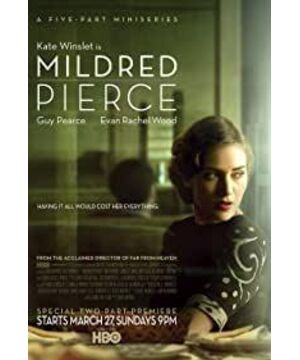This is a MINI drama produced by HBO, who has filmed novels and returned to TV dramas.
A total of 5 episodes, nearly five hours, tells the struggle history and successes and failures of an ordinary single mother during the Great Depression in the United States.
I haven't read Cain's original novels, nor have I seen previous versions of movies. As for the professional vocabulary of "Noir Fiction", I don't know much about it. I just spent a whole night watching this MINI drama without rest. It's not so ups and downs that I can't stop it, but it does have the temptation for me to watch it all at once.
The story starts from a corner of a family, the music is brisk, the pie is delicious, the little life of the middle class is so beautiful, and then there is a dull conversation between husband and wife—such as going out, watering, water bills, time to return home and other trivial beginnings, and finally finally It broke out in the finishing moves like "then you pack things and go".
Then Mrs. Pierce, starred by Kate Winslet (Kate Winslet), officially began to enter the world's largest society, the greatest association in the United States that has never been mentioned.
The next step is struggling, fighting, dealing with some men, being a strong woman, and fighting with the daughter who should be the closest in the world.
The plot is not so blablablabla. I don't think anyone wants to let me repeat the movies they have watched or planned to watch or are watching.
So let's talk about Mildred, a woman whose failure and success are half-divided, and happiness and sadness emerge from each other. And, another important role in this game, Mildred's daughter Veda.
After watching the whole film, Mildred showed an unusually calm and indifferent face to many things, first of Bert’s derailment-she already knew it, and she could also mention it indifferently after the children and family expenses, although Eventually it broke out, but there was no such thing as crying, making troubles and hanging up in the traditional sense. Even talking to neighbors and friends and exonerating her husband in time, "Bert is not that bad"; then it was the distress of livelihood, not finding a job, or even Only holding a few coins to buy dishes without meat, even if she shed tears in grievance, she can politely deal with her husband’s former partner in the next moment; the next thing is the various gender issues that single women face, she even Did not reveal any violations, or acceptance or rejection, frank and natural, clear of her purpose and hope, Wally, or Monty, money, sex, and love; there are other kinds of things, this woman is strong and brave enough , But a strong woman may be what an inspirational drama should have, isn’t it?
I won't discuss Kate's acting skills, but the indifferent tone that hides most of the ups and downs, the big sighs that appear when you are extremely conflicted or painful or angry, and the feeling of cutting off sentences, all reveal Mildred's mood.
However, this seems a bit depressing and depressing.
Of course, if you move forward unswervingly like steel, this film will really be an inspirational masterpiece, but unfortunately it is not. Mildred Pierce has had several outbreaks, and it is very obvious that they are all related to her beloved daughter Veda-either the person or the content of the conversation. Even in the end, the lady who rarely angered and screamed finally gave up everything and rushed to strangle her daughter's neck.
She finally broke down and released a hand with the audience's share.
Then return to the pace of the past.
If you really want to analyze what makes Mildred like this, it is really complicated, but based on my simple understanding, it is better to blame it on the "posture" of the middle class-the identity and self-awareness that cannot be given up even in the depression. . The various problems that are hidden under the glamorous surface-"derailment", "frustration", etc., as long as they can be concealed by "identity", it is not a problem at all. Mildred uses his self-esteem and upbringing to make those screams and cry The trouble turned into sighs and blinking anxiously, and finally finished what he wanted to say.
However, only when Veda is denying her ideology, perhaps it is the way of thinking, or the way of earning a living, or the vision of men, or all kinds of men. In Mildred's eyes, Veda is her ideal daughter. However, this daughter naked and cruelly stripped off the self-esteem that Mildred had built up in her own way of speaking. Mildred felt that her beautiful little daughter had some of the things she was most proud of. Veda, who was affirmed by her, denied Mildred's qualifications as a person of status, denied her judgment, denied the pride and status brought by her money, denied her boyfriend, denied her attractiveness.
Even denying her, Mildred considers himself the greatest and most selfless love.
Mildred collapsed not only because of the hurtful daughter's attack, but also because of the destruction of her self-esteem.
The reason why he became the last Veda who played tricks to destroy his mother cannot simply be attributed to the fact that he was a born little demon. Perhaps it should be more understood as a conclusive display of social consciousness projected on her through Mildred and Bert—the damn pride of
being a superior person: What Veda learns is piano, even though everyone thinks she doesn’t She didn't have that talent, and she even admitted it later, but Mildred still insisted that Veda was talented. She thought so from the beginning until the end. Because what makes this mother so blind? It's definitely not just maternal love, but part of the reason is because the piano is an elegant art. I believe that even if Veda's talent is to make pies, Mildred will not allow her to make a fortune with herself.
Veda's accent, the high-profile British-American language, and her attitude towards the girls who help her at home all show that this young lady really positions herself as a superior person. The title of Miss Veda. The dispute between the two on the uniform of the maid also fully reflects that the fundamental contradiction between her and Veda is not how to treat the maid girl, but the uniform itself and the money spent by her two daughters when they go swimming, etc. problem. Mildred is not angry about human rights issues, but that the secrets hidden behind his middle-class posture have been exposed. She may not have thought about what the servant girl is in this dispute.
In the later period, Veda's attitude towards money, she felt that her mother's money was not something to be proud of. To her, being a waiter and a business woman were both secular and superficial, and even embarrassing. While spending her mother’s money to dress herself up as an artistic and elegant soprano female singer, she tried her best to escape from this small town that she did not belong to her class, and went to New York to be a real classy person. .
If you look closely, you can find that Veda's attitude towards identity, class, and money is almost the same as Mildred's, but it goes further and more extreme.
Mildred always regarded Veda as a genius and proud little princess. She raised Veda with the mentality of treating her dreamy little daughter. She did it, and gave Veda the best she could imagine. , Even devoted her entire career to buy a big castle that meets Veda's and her own desires.
Mildred is a beautiful and mature woman who lives between reality and dreams. She reconciles dreams and reality. Veda is not. She is completely obsessed with fantasy and cannot extricate herself. She also uses various methods to make the illusion come true, no matter what. Will it hurt her.
So I think this story should not be a reflection of the personal relationship between a mother and a daughter, at least it cannot simply be attributed to the story between "a hard-working mother" and "a little white-eyed wolf's daughter".
Sometimes the family is the epitome of the whole society. Everything Mildred tried to achieve was achieved except for a "perfect daughter", but after thinking about it, it seemed that all was a face-saving project-the restaurant (it must be admitted that she was arguing with her daughter) Later, she took learning to operate a restaurant as her starting point. This was simply putting the cart before the horse. At first, she was just trying to make ends meet, and she cried to help her social status. We can see that she found the reason in her desperation not only to help her. She saved her face and found motivation for herself), a man (Bert may have really loved him, of course, he was once a real estate agent and the parents of a rancher, Wally is just a transitional product, so you can ignore its fundamental background. The posture of a noble descendant like Monty is more in line with Mildred's needs and aesthetics. It is definitely not only because he is handsome and terribly in love at first sight. The key is that she is willing to marry him), the house (moving out of Glendale and moving into the big one) Scary luxury residence), daughter (beautiful, elegant, maybe a piano genius, no, it doesn’t matter if you are not a piano genius, the actor is better, but the actor can’t? The soprano is even more amazing, so you can devote yourself to preparing a concert for it , Such as that exaggerated skirt).
Of course, Mildred may not feel that she is for the sake of face or face, because in her ideology, social status is an inevitable label for women like her, and it is not wrong or wrong to make this label perfect and proud. Extra work.
The only thing that is bad is that the "pride" between her and her baby daughter is essentially different. Mildred believes that the label can be improved with external force, while her daughter Veda believes in her bones that social status is inherent, and she believes in her. It should be a superior person who lives aloof. Because she has never experienced depression like Mildred, she thinks that she should live for the better, and that's right. So Veda hates Glendale, because this is an ordinary town, there is also a merchant mother who has worked hard from ordinary to extraordinary, and the noisy and noisy relationships around her mother.
In Veda's eyes, the more successful Mildred is, the more proof that Veda is not a born nobleman.
Of course, she was not, but she fancied that she was.
The contradictions are irreconcilable, and young girls can only use hatred of reality and hatred of their mothers to ease their inner resentment.
Whatever the husband’s extramarital affairs, what financial constraints, what hard work, compared with the naked hatred of the daughter, it is nothing. But in fact, those are the prerequisites, and the state of the daughter is the result.
Mildred finally rushed into the room of his second seemingly perfect husband, and when she saw that it was indeed her daughter’s disdainful eyes, she still held back. At that moment, she was just confused and painful, and even struggling. She even said what Monty said. She could bear it, staying on the spot, and even trying to explain as hard as she had done many times before, explaining to the other party to explain to herself, she opened her mouth and made an unclear sound.
But she was angry right away, because Veda was sitting at her dressing table, she was beautiful and slender, and her husband put on her pajamas.
Mildred's anger was definitely not directed at Monty. She really didn't care about Monty's meaning in this chaos. The man was just a symbol, a symbol that indicated that Veda completely looked down on himself and completely ignored him. After all, for Mildred, a handsome man who once brought her warmth and smile is still no match for the hurt caused by his caring daughter. No, not just maternal love, Mildred may instantly realize that the "perfect daughter" he worked hard to create is being denied by the real daughter, and this real daughter is too vicious and terrifying.
It's like some devil swallowed his Veda.
I think Mildred might have thought the same the moment he rushed to pinch Veda's neck.
After all, Veda deliberately eliminates her inner anxiety about the "superior status". She wants to completely obliterate the existence of her mother, even her father together. What stayed in her life should be such a graceful fallen aristocrat as Monty. This is her values. Maybe even Monty couldn't satisfy her in the end. The identity and status as well as the social order imagined in her mind need to be shaped in such a thorough way.
Maybe in the end Mildred patted the car window and said "Never come back". These words finally cut off the chain-like painful shackles on her and Veda, and lost the restaurant, the big house, and the man. At this time, Mildred may have already Returning to the ordinary, she chose to remarry her ex-husband Bert, just like most people who had struggled from the Great Depression. All she needs is a peaceful life.
Those desires, either bad or good, are just like Mildred's last sitting in her first restaurant, Bert said to her: "Let her go to hell."
Mildred's expectations of social status and identity have returned again. In the past, it can be said that once there is no such thing as Veda which makes her have to constantly improve herself, Mildred can balance herself.
There is actually no right or wrong in Mildred Pierce, and don't talk about graciousness. What you have to say is just cause and effect.
And that damn face project.
But then again, who doesn't want a more beautiful face in this world? It's just that the method and the degree are different.
View more about Mildred Pierce reviews











